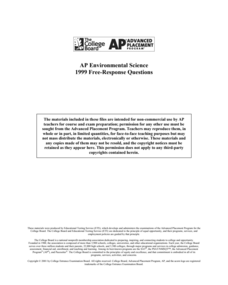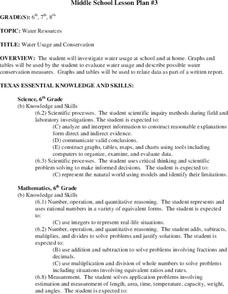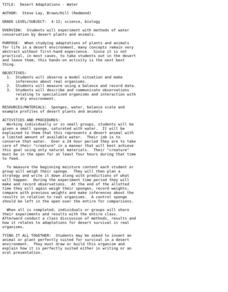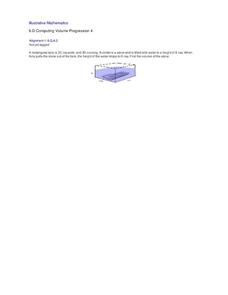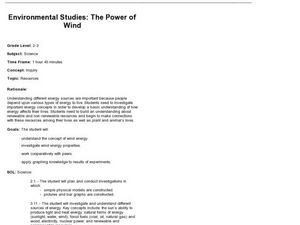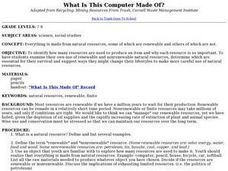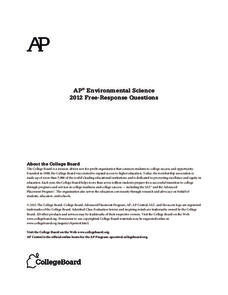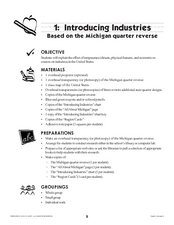College Board
1999 AP® Environmental Science Free-Response Questions
Pollution is a real concern in most areas of Earth. A four-question AP® assessment has learners analyze data related to water pollution and air pollution as well as consider the pros and cons of recycling. Each question has several...
CK-12 Foundation
CK-12 Earth Science Concepts for Middle School
Explore a variety of science concepts in an interactive textbook created for middle school scholars. A lengthy table of contents takes readers to pages comprised of a subject overview, outline, and summary. Follow links further to find...
Curated OER
No Impact Project: Water
Students use the "No Impact Project" to analyze the consumption of water. In this water consumption instructional activity, students discuss the pros and cons of tap water or bottled water. Students read about chemicals in water and...
Curated OER
Water Filtering
Young scholars investigate how polluted water is filtered so people can use this recycled resource. They conduct an experiment in which they put "polluted" water through a filtering system. They investigate what happens at a water...
Curated OER
Water and the Earth
In this water and Earth learning exercise, students read a 2 page article on water and the Earth, name the clouds in 2 pictures and then list 4 sources of water in nature.
Curated OER
Water - Planning for the Future
Students explore and examine the increases and/or decreases for water user groups: irrigation, municipal, manufacturing, steam electric power generation cooling, livestock, and mining. They utilize percentage changes during their...
Curated OER
Forces of Nature Vocabulary Quiz
In this science worksheet, students draw lines to match 13 words pertaining to forces of nature to their definitions in another column. Example: tornado, tide, erosion, pressure.
Curated OER
The Water Detectives
Students collect water samples from designated sampling stations, and discuss water pollution. They analyze the water samples, record the data on a spreadsheet, and present the environmental water quality data to the class.
Curated OER
Clean Water vs. Dirty Water
Pupils study the importance of clean water to the survival of organisms and what activiities and material pollute water. They measure the temperature of water samples and create a class graph.
Curated OER
Water Usage and Conservation
Learners investigate water usage at school and at home. They use graphs and tables to evaluate water usage. Students describe possible water conservation measures. They use graphs and tables to relate data as part of a written report.
Curated OER
Water Quality in the Greenhills Stream
Seventh graders conduct year long study of water quality over different seasons using variety of probes, including D.O., pH, conductivity and temperature, that are attached to portable technology. Students select three data points in...
Curated OER
Desert Adaptations: Water
Students experiment with methods of water conservation. In this water conservation lesson, students explore the importance of water for plants and animals in a desert biome.
Curated OER
The Water Cycle
Second graders use the program HyperStudio to draw and describe the water cycle. In this science and technology lesson, 2nd graders will first become familiar with the water cycle by exploring books and websites in the classroom. Next,...
Curated OER
Water and Ice
Students observe what happens to water as it goes from a solid to a liquid. In this exploratory instructional activity students gain an understanding for the water cycle while working in groups observing what happens to water as it...
Curated OER
Water and Ice
Learners explore the physical properties of water. In this water lesson, students observe, measure, and describe water as it changes state. There are 2 extensions for this lesson that one can access via the Internet links provided.
Illustrative Mathematics
Computing Volume Progression 4
This resource was written for the younger math learner, but finding the volume of an irregular solid is also a problem for algebra and geometry students. Based on Archimedes’ Principle, one can calculate the volume of a stone by...
Curated OER
Environmental Studies: The Power of Wind
Investigate the prospect of wind as a renewable resource. Second and third graders make a pinwheel, answer critical thinking questions, and then attempt to use wind power to wind string. I would be more apt to use this activity in a 1st...
Curated OER
Looking at Landforms-Based on the Washington Quarter Reverse
Students use a Washington State Quarter to examine different landforms and discuss natural resources. After a class discussion on the items found on a Washington State quarter, students brainstorm a list of natural resources found in...
Curated OER
California's Resources
Students research the natural resources of the state of California. They read a chapter of their social studies text, write and answer questions for the chapter, and create illustrations for five vocabulary terms.
Curated OER
What Is This Computer Made Of?
Students identify how many resources are used to produce an item and why each resource is so important. They examine their own use of renewable and nonrenewable natural resources.
Curated OER
Erosion
Young scientists identify erosion, explain the causes of erosion, and name some techniques that can slow the process of erosion. Learners are divided up into groups of four and perform a simulation of soil erosion in class. The...
Curated OER
How Much is Dirt Worth?
Dirt is worthless, isn't it? Find out the true value of dirt, and by dirt I mean soil. The class explores what makes soil, the types of soil, and what happens when soil becomes void of its nutrients. There are several great activities,...
College Board
2012 AP® Environmental Science Free-Response Questions
Sometimes solving one problem leads to another. Scholars respond to questions about fracking to harvest natural gas and other environmental related topics. The resource provides items released from the 2012 AP® Environmental Science exam...
Curated OER
Introducing Industries
If you are looking for a way to explore Michigan's resources, physical features, and more, this instructional activity is for you. After discussing Michigan and the Great Lakes, learners fill out a graphic organizer identifying the...


